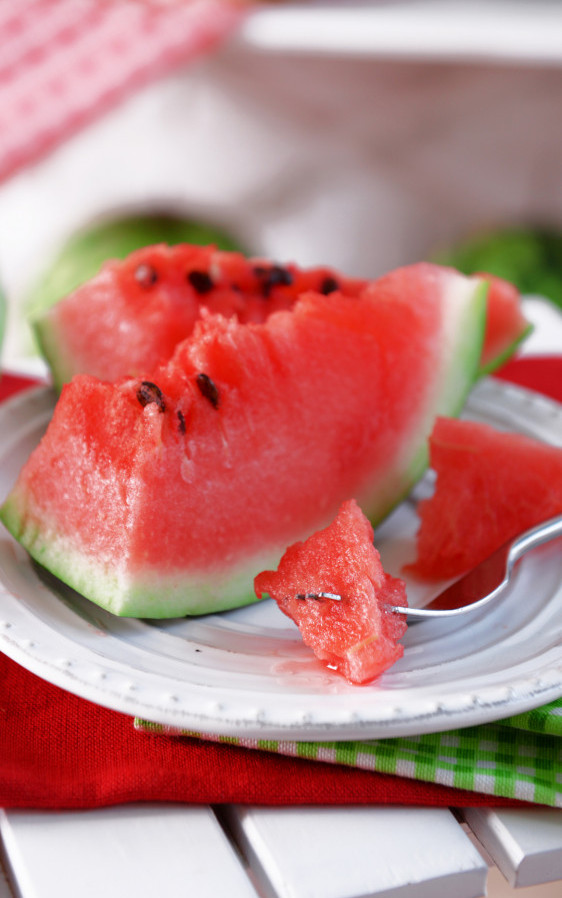
Watermelon is amazing! It has been my favorite fruit since I was a little kid. Watermelon is one of the most popular foods in America. It’s sweet and refreshing, and it has a lot of health benefits. In this article, I’ll discuss ten reasons watermelon is good for your health.
Excellent Source of Lycopene
Lycopene, a carotenoid found in watermelon, is known to be a powerful antioxidant that can help protect against heart disease and cancer. Lycopene also helps reduce cholesterol levels in the blood.
Watermelon is an excellent source of vitamin C (providing about 22% of your daily value per cup), which helps fight colds and flu by boosting the immune system. A cup of watermelon also offers more than 10% of your daily value for vitamin A.
Keeps You Hydrated
Watermelon is 92% water, so it’s a great source of hydration for the body. In addition, it can help with water retention and make you feel fuller than other fruits.
If you’re looking for more reasons to make this melon your favorite summer snack, here are six more health benefits of watermelon:
Helps in Weight Control
If you’re worried about the calories in watermelon, don’t worry. Watermelon is 92% water. It’s also relatively low in calories and fat, making it an excellent choice for those who want to lose weight or maintain their current weight. As a bonus, because it is lower in sugar than most fruits, it won’t cause blood sugar spikes as some other foods can.
Watermelon is also a good source of fiber and contains vitamins A and C and potassium, all essential nutrients that help keep your body running smoothly. In addition, numerous studies show that consuming lycopene helps reduce the risk of certain cancers such as prostate cancer or even pancreatic cancer!
Low-Calorie Treat
Watermelon is a low-calorie food. According to the USDA National Nutrient Database for Standard Reference, a cup of watermelon contains only 45 calories, making it an excellent choice for weight loss or maintenance. You can eat as much as you want without worrying about adding too many calories to your daily diet. Watermelon also makes a good choice if you’re trying to gain weight; remember that any extra calories will count toward your daily calorie goal!
In addition to being low in calories, watermelons are packed with nutrients and other health benefits: They’re high in fiber, vitamin C, lycopene (an antioxidant that may reduce your risk of cancer), potassium—which helps maintain healthy blood pressure levels—and antioxidants (another defense against heart disease).
Refreshing on Hot Summer Days
Watermelon is a summer fruit often associated with warm days and picnics. While it might not be at the top of your list when it comes to fruits that taste good, watermelon is an excellent choice for those of us who love having something refreshing in our hands on hot summer days.
One of the best things about watermelon is its vitamin A content, which helps prevent cell damage and fights free radicals that lead to aging, cancer, and heart disease. It also contains lycopene, a carotenoid antioxidant found in tomatoes (so if you’re eating both together on your picnic blanket this weekend—you’re getting double-duty!).
High in Nutrients
Watermelon is an excellent source of vitamins A, B6, C, E, and K. It also contains folate, magnesium, potassium, and manganese. But what’s most impressive about this fruit is its lycopene content.
Lycopene is an antioxidant that protects against cell damage caused by free radicals, meaning that it can help prevent cancer and heart disease and reduce the signs of aging, like fine lines on your face or wrinkles in your skin!
Has a Significant Amount of Potassium
Potassium is an important electrolyte that helps regulate your body’s water balance, nerve and muscle function, heart rate, and blood acidity. It also plays a role in maintaining healthy kidney function. Conversely, potassium deficiency can cause several health problems such as fatigue, high blood pressure, and an elevated risk for stroke or heart attack. Watermelon is naturally rich in potassium: one cup contains 422 mg—or nearly two-thirds of your recommended daily intake.
Supports Antioxidant Systems
Antioxidants help fight free radicals, which are unstable oxygen molecules that can cause damage to the body. Free radical damage has been linked to some health conditions, including cancer, heart disease, premature aging, and wrinkles.
Antioxidants are also responsible for helping your body repair itself after injury or illness. If you’ve ever experienced a muscle ache after exercise—or felt soreness in other areas of your body after an injury—you know how important antioxidants can be!
Helps with Digestion and Regularity
You can also help to keep your digestion regular by consuming watermelon. Watermelon is a good source of fiber, which helps with digestion and regularity. In fact, one cup of watermelon has 3 grams of fiber—that’s about 9% of the daily recommended intake! Another fantastic benefit: Magnesium also helps with digestion and regularity, so that you can get this mineral in abundance from watermelon. Fresh peppermint is perfect if you want to enjoy something refreshingly and minty without any added sugar or artificial flavors.
Supports Heart Health
Watermelon is a good source of potassium. Potassium helps to reduce blood pressure, and depletion is associated with an increased risk of death from cardiovascular disease.
Vitamin C (which watermelon contains) also has a beneficial effect on heart health. Research has shown that people who consume more vitamin C have a reduced risk of heart disease, stroke, and other related conditions.
Lycopene may play a role in reducing the risk for cardiovascular disease as well. For example, one study found that participants who consumed high amounts of lycopene had significantly lower LDL cholesterol levels than those who did not regularly take it.
Eating watermelon can be a sweet and delicious way to support your overall health.
Watermelon is a good source of lycopene, an antioxidant that helps protect you from heart disease. Lycopene is found in tomatoes and pink grapefruit, so if you’re not a fan of watermelon but love tomatoes, try adding some red grapefruit to your diet.
Watermelon contains potassium and has been shown to help lower blood pressure by reducing sodium levels in the body. In addition, according to Harvard Health Publications, getting enough potassium can reduce the risk of kidney stones by up to 40%. Watermelon will also keep your bones healthy because it contains magnesium—a mineral that helps build strong bones. Plus, it’s low-calorie!
Final Thoughts
Eating watermelon can be a sweet and delicious way to support your overall health. The high antioxidant content of this fruit makes it a fabulous snack option. Still, its very nutritious, low-calorie, and low-sugar content also makes it an excellent choice for anyone looking to lose weight or manage their diabetes.


